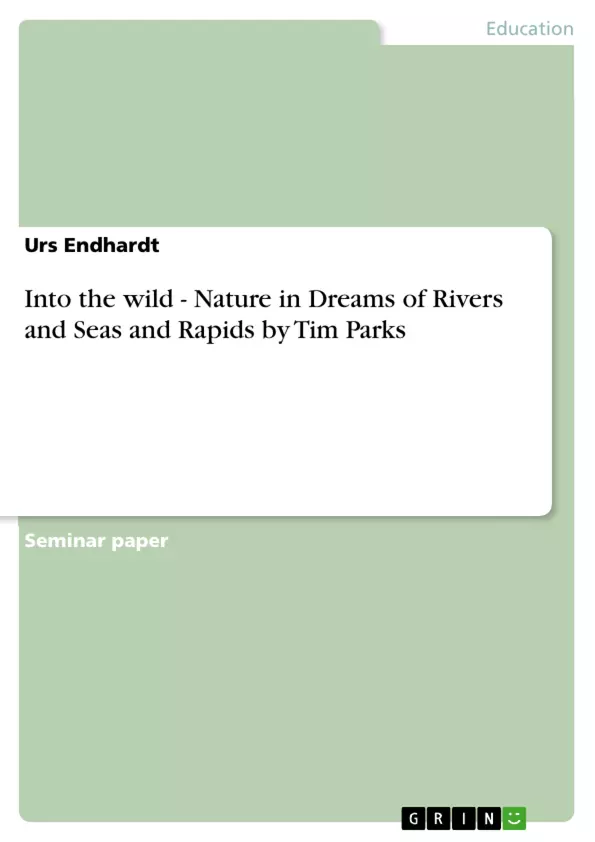Hurricane sandy, which raged over the Eastern United States last autumn and caused widespread damage and claimed the lives of over hundred people, was a reminder of how relevant the first quote still is. And Goethe was also right in writing that nature goes its own way. His last sentence, however, is not true anymore. Humanity influences nature, causes these exceptions, and is affected by the results. In this paper, I am going to examine Tim Parks’ novels Dreams of Rivers and Seas and Rapids from this point of view. In both novels the protagonists try to gain control over nature and to overcome the hardships which it imposes upon them, but finally have to recognize that it has not only prevailed, but has also altered them and their lives profoundly. As nature has a wide-ranging meaning in literature, the term needs to be narrowed down at first. While the lexical definition is understandable, describing it as "the phenomena of the physical world collectively" (OED 2013), the debate in philosophy is more complex, discussing whether nature exists in reality or only as a social construction in our heads. Dingler (2005: 29-30) concludes that in modern thinking humans consider nature to be a "Teil der Realität [...] der vom Menschen unabhängig ist." Only through knowledge is it possible to acknowledge the reality of nature. This theory is based on the Cartesian dualism, which distinguishes between the sphere of nature and the sphere of culture (31). As humans we live in the sphere of culture, yet we are also inhabitants of nature, and existed in it before we even developed a noteworthy culture. Humans are considered as being born wild and egoistically, and only through cultural influences such as education and norms do we develop the ability to live together (Borghini 2013).
In the course of this paper I am now going to work out which different approaches to nature the protagonists have, and how they are related to it. Additionally, I will discuss the effects which the contact with nature has on the development of the protagonists. I am also going to identify different motifs which Parks employed in the novels, and analyze them in consideration of their relation to nature and the actions of the protagonists. Given the fact that nature is a literary topic since thousands of years, I will also contextualize and compare Park’s novels with other literary writings of different origins and epochs.
Inhaltsverzeichnis (Table of Contents)
- Introduction
- Dreams of Rivers and Seas
- Rapids
- Conclusion
- References
Zielsetzung und Themenschwerpunkte (Objectives and Key Themes)
This paper examines Tim Parks' novels Dreams of Rivers and Seas and Rapids from the perspective of how the protagonists attempt to control nature and overcome its challenges, ultimately recognizing that nature not only prevails but also profoundly alters them and their lives. It explores the complex relationship between humans and nature, analyzing the protagonists' approaches to nature and the impact of their experiences on their development. The paper also identifies and analyzes motifs employed by Parks in both novels, contextualizing them within a broader literary framework.
- The human attempt to control nature and the consequences of that attempt
- The influence of nature on human character and development
- The role of rivers as a metaphor for life's journey
- The contrast between anthropocentrism and ecocentrism
- The significance of nature in literature across different epochs and cultures
Zusammenfassung der Kapitel (Chapter Summaries)
- Introduction: This chapter introduces the paper's focus on Tim Parks' novels and how they explore the relationship between humans and nature. It establishes the historical and philosophical context surrounding the concept of nature, including the debate between anthropocentrism and ecocentrism.
- Dreams of Rivers and Seas: This chapter analyzes John's character from Dreams of Rivers and Seas and his attempts to control nature through his scientific research. It highlights the contrast between his meticulous, detail-oriented approach and his mother's more holistic view of medicine. The chapter also explores John's desire to understand the fundamental forces of the universe, drawing parallels to Goethe's Faust.
Schlüsselwörter (Keywords)
This paper focuses on the themes of nature, control, human development, anthropocentrism, ecocentrism, river symbolism, scientific research, and literary motifs. It examines the works of Tim Parks, drawing connections to other literary texts from various epochs and cultures.
Frequently Asked Questions
How does Tim Parks depict the relationship between humans and nature?
In his novels, Parks shows protagonists attempting to control nature through science or activity, only to find that nature ultimately prevails and changes their lives profoundly.
What is the difference between anthropocentrism and ecocentrism in this context?
Anthropocentrism views nature as a resource for human use and control, while ecocentrism acknowledges nature's intrinsic value and independent existence.
What does the river symbolize in Parks' novels?
The river serves as a powerful metaphor for life's journey, representing both a force to be mastered and an uncontrollable element that shapes human destiny.
How does scientific research relate to nature in "Dreams of Rivers and Seas"?
The character John attempts to use scientific research to gain a meticulous, detail-oriented control over natural phenomena, contrasting with more holistic views of the world.
How does the paper define "nature" philosophically?
It discusses nature both as the physical world and as a social construction, highlighting the Cartesian dualism that separates the spheres of nature and culture.
- Citation du texte
- MA Urs Endhardt (Auteur), 2013, Into the wild - Nature in Dreams of Rivers and Seas and Rapids by Tim Parks, Munich, GRIN Verlag, https://www.grin.com/document/213705



